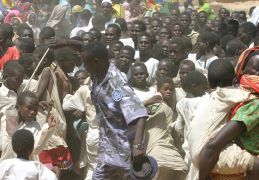Humanitarian crisis possible in Sudan’s Darfur
Sept 5, 2006 (KHARTOUM) — The U.N. secretary-general warned Tuesday that Sudan would bear full responsibility for the worsening humanitarian crisis in Darfur if African Union peacekeepers pull out by month’s end because of the government’s refusal to allow a U.N.-led force to take over.
 The cash-starved and understaffed African Union force, whose mandate ends Sept. 30, has been unable to halt the violence in Sudan’s western region. Sudan, which recently launched a new military offensive against rebels in Darfur, has ordered the African Union out if it insists on handing over the mission to the United Nations.
The cash-starved and understaffed African Union force, whose mandate ends Sept. 30, has been unable to halt the violence in Sudan’s western region. Sudan, which recently launched a new military offensive against rebels in Darfur, has ordered the African Union out if it insists on handing over the mission to the United Nations.
The absence of any foreign troops in Darfur would likely lead to widespread misery or starvation in camps flooded with refugees from a bloody conflict that has raged for the past 3 1/2 years. International aid workers — lacking any protection — would almost certainly pull out if the 7,000 AU troops leave and are not replaced by U.N. peacekeepers. The U.N. has warned of hundreds of thousands more deaths if aid operations collapse.
Sudanese President Omar al-Bashir has rejected the U.N. presence as an attempt to impose Western colonial control over his country and has instead offered to send 10,000 government troops to Darfur. Critics say such a move would only inflame the violence.
Despite Secretary-General Kofi Annan’s sharp warning, the U.N. and the West — preoccupied with crises in the Mideast — may have little appetite or ability to push Sudan hard to comply. Many observers believe Sudan has dug in against a U.N. deployment in the Texas-sized region because it wants to finish off the rebels, and also fears the international force will hunt down officials and government allies suspected of war crimes.
Annan criticized Sudan’s call for the departure of the African peacekeepers and expressed concern at its refusal to accept the 20,000-member U.N. force, which would have a stronger mandate to end the fighting. He warned that Sudan would be unable to address the humanitarian disaster.
“The international community has been feeding about 3 million people in camps, and if we have to leave because of lack of security, lack of access to the people, then what happens? The government will have to assume responsibility for doing this, and if it doesn’t succeed, it will have lots of questions to answer before the rest of the world,” Annan said in the Egyptian port city of Alexandria after talks with President Hosni Mubarak.
Since the conflict began with ethnic African rebels seeking more autonomy in Darfur, the Sudanese government has been accused of unleashing Arab militiamen known as janjaweed who have been blamed for widespread atrocities, including rapes and killings. Some 200,000 people have died and several million have been displaced since 2003.
Despite a May peace deal signed by the government and one of the three ethnic African rebel groups, U.N. officials and aid workers say the crisis has only deepened in recent months, with violence at a new high. Twelve aid workers have been killed in Darfur this year, most in the last two months.
The latest government offensive in northern Darfur, launched Aug. 28, reportedly involves thousands of troops and militias backed by bomber aircraft and helicopter gunships. The military is also believed to be massing more forces in the region.
Nigerian Gen. Collins Ihekire, who heads the African Union force, said that latest offensive would cripple the civilian population.
“The government is not making a secret of their desire to flush out the remains of the rebels. … Whenever there is an upsurge in violence, there is always more collateral damage, the generation of (displaced people), more banditry, more rapes,” he told The Associated Press by telephone from Darfur.
Rebel commander Abubakar Hamid Elnur told the AP by satellite telephone from northern Darfur that there had been no armed clashes with government forces and their janjaweed allies for three days but that bombing raids on rebel-held areas were continuing north of the provincial capital, El Fasher.
“They are bringing in more troops and blocking off the roads. We believe the government is preparing for another major assault,” he said. Civilians were unable to flee the area but had left their homes for the valleys and hills, he said.
The rebels in the Sudanese Liberation Front who signed a May peace deal in return for government posts have accused Sudan of violating the accord by forcing out the African peacekeepers and rejecting the U.N. presence.
“We call on the international community to send troops as soon as possible, because there is no security in Darfur, the situation is very bad,” said Mahjoub Hussein, a spokesman for Sudanese Liberation Front leader Minni Minnawi.
At an emergency meeting in the Ethiopian capital of Addis Ababa on Monday, African diplomats agreed that the AU peacekeepers could stay on for a few months if Sudan approves the transition to a U.N-led force, said spokesman Nouredinne Mezni.
But Sudan said the AU force can remain in the country only if it rejects the U.N. force and accepts Arab League and Sudanese funding. Such an arrangement would make the AU troops even more dependent on the good will of Sudan’s Arab-led government.
(AP/ST)
